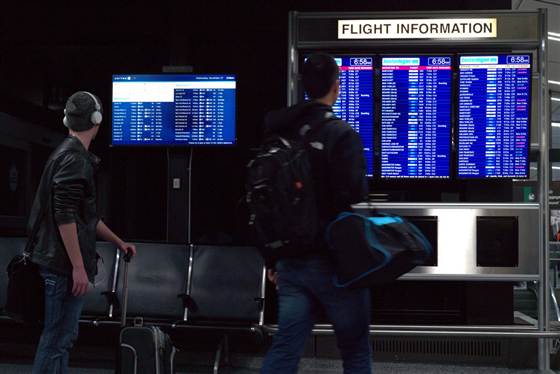From NBC News:
 The question is one you may have asked yourself while standing in line at the airport or when trying not to scream in frustration while sitting on the tarmac waiting to take off: If airlines know there will be a surge of passengers during the holidays, why don’t they add capacity in the form of extra flights?
The question is one you may have asked yourself while standing in line at the airport or when trying not to scream in frustration while sitting on the tarmac waiting to take off: If airlines know there will be a surge of passengers during the holidays, why don’t they add capacity in the form of extra flights?
While it makes sense in theory, the reality is far more complicated.
Despite mergers in recent years and the retiring of older, less-efficient planes, carriers have nowhere to turn for a dozen planes the week before Thanksgiving.
That’s not how the commercial airline business was set up to operate, industry experts said.
“It’s not realistic to think airlines could add planes for a few days,” said Josh Marks, CEO of airline consulting firm masFlight. “The airlines would love to have the flexibility to add capacity, but the system is not set up for it.”
There’s no Hertz for airlines looking to add a Boeing 737 for a week or two—leasing companies don’t operate that way. And because airlines have transformed themselves to be as lean as possible, they don’t keep “extra” planes sitting around.
Even if the airlines could get their hands on, say, a dozen planes, who would fly them or serve passengers? Carriers are already fully staffed and have crews tightly scheduled. Most airlines have recalled all the pilots they furloughed before the recession.
Even if some idle pilots were available for temporary hire, existing pilots would be up in arms that “rental crews” were brought in to handle a particular route.
System stretched to the max
On top of that, airport takeoff and landing slots are already jammed at many of the busiest airports.
Take LaGuardia Airport in New York. Even if an airline wanted to add three or four more flights out of the airport on the Tuesday before Thanksgiving, when would they take off? LaGuardia is already slot-controlled, meaning the Federal Aviation Administration limits the number of takeoffs and landings per hour, as is Washington’s Reagan National Airport.
If one airline wanted to add three flights on that Tuesday, its competitors would want to match it and add flights. Soon, the most congested airspace in the U.S. would be even more so. You get the picture: Gridlock, raised to a whole new level.
Increased air travel would mean more users of facilities whose infrastructure is already threadbare.
“Our airports are so clogged up that we’re going to face Thanksgiving almost every day in a few years in every airport,” Roger Dow, president and CEO of the U.S. Travel Association, said recently.
Tighter capacity, higher fares
The argument for adding more planes also ignores one crucial factor to airlines: profitability.
Keeping capacity in check in recent years has allowed carriers to turn a profit. They now fly fewer planes with a higher percentage of passengers. While we may not like that there are few choices or discounted fares, that’s exactly what the airlines want.
On the busiest days of the year, like the Sunday after Thanksgiving, airlines will run their fleets faster and add as many flights as possible. According to masFlights, Delta Air Lines will run 10.5 percent more flights on Sunday, Dec. 1, than it did on Sunday, Nov. 14.
“When it’s busy, the airlines are at capacity,” Marks said. “There’s no wiggle room to add more.”
Source: http://www.nbcnews.com/travel/why-dont-airlines-just-add-more-flights-holidays-2D11663461
